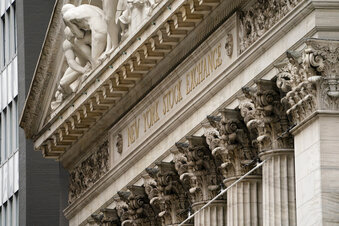Stocks open lower on Wall Street, extending market’s losses
3 min read
FILE - The New York Stock Exchange operates during normal business hours in the Financial District, Wednesday, Oct. 13, 2021, in the Manhattan borough of New York. Stocks are opening lower on Wall Street, Friday, April 22, 2022, capping a bumpy week as the Federal Reserve promises to be more aggressive about fighting inflation. (AP Photo/John Minchillo, File)
NEW YORK (AP) — Stocks are opening lower on Wall Street following drops in overseas markets, continuing a losing streak for U.S. markets that has brought the benchmark S&P 500 index down for three weeks in a row. Energy companies had the biggest losses in the early going Monday as crude oil prices fell more than 5%. Banks, industrials and big technology companies were also lower. The S&P 500 was down 0.7%. Prices for ultra-safe U.S. government bonds rose as traders shied away from risk. Shanghai’s stock index sank 5.1% as China reinforced its stringent pandemic policies while case numbers rose.
THIS IS A BREAKING NEWS UPDATE. AP’s earlier story follows below.
NEW YORK (AP) — Wall Street pointed toward a lower open Monday after European and Asian markets fell sharply as worries over interest rate hikes dominated an array of investor concerns.
Futures for the Dow industrials tumbled 0.7% while the same for the S&P 500 fell 0.8%.
Shares in Twitter jumped almost 5% in premarket after multiple media outlets reported that the company’s board and Tesla CEO Elon Musk negotiated into the early hours of Monday over his bid to buy the social media platform. Musk said last week that he had lined up $46.5 billion in financing to buy Twitter, putting pressure on the company’s board to negotiate a deal.
The Shanghai Composite index sank 5.1% and Hong Kong fell 3.7% as China reinforced its stringent pandemic policies while case numbers rose.
The news that Emmanuel Macron won the run-off French presidential election over the weekend, clinching a second term as was widely expected, reassured markets that France won’t abruptly shift course in the midst of the war in Ukraine.
But the significant show by contender Marine Le Pen, a populist and nationalist, served as a reminder of how fragile that situation might be, analysts said. Le Pen pledged to dilute French ties with the EU, NATO and Germany, and spoke out against EU sanctions on Russian energy supplies.
France’s CAC 40 dropped 2% in midday trading. Germany’s DAX lost 1.3% and Britain’s FTSE 100 shed 2%.
In Asian trading, Japan’s benchmark Nikkei 225 lost 1.9% to finish at 26,590.78. South Korea’s Kospi slipped 1.8% to 2,657.13. Hong Kong’s Hang Seng dropped 770 points to 19,869.34, while the Shanghai Composite shed 158 points to 2,928.51, dipping below 3,000 for the first time since July 2020.
Hong Kong-traded shares in Internet company Baidu slumped 7%, while PetroChina lost 4% on falling oil prices.
“Coming after the heavy sell-off in Wall Street to end last week, overall risk appetite in the region may come under pressure as well,” said Yeap Jun Rong, market strategist at IG in Singapore.
Rising COVID-19 cases in China are setting off worries about more pandemic lockdowns that would crimp economic recoveries in the region. Beijing imposed lockdowns in several districts after case numbers rose.
Investors are also watching earnings reports and forecasts from companies, some of which have been disappointing — such as Netflix and Verizon — and contributed to Wall Street’s decline last week.
What the U.S. Federal Reserve might do is high on investors’ minds. The chair of the Federal Reserve has indicated the central bank may hike short-term interest rates by double the usual amount at upcoming meetings, starting in two weeks. The Fed has already raised its key overnight rate once, the first such increase since 2018.
Markets around the world are feeling similar pressure on rates and inflation, particularly in Europe as the war in Ukraine pushes up oil, gas and food costs.
In energy trading, benchmark U.S. crude lost $4.92 to $97.15 a barrel in electronic trading on the New York Mercantile Exchange. Brent crude, the international standard, fell $4.86 to $101.29 a barrel.
In currency trading, the U.S. dollar edged down to 128.24 Japanese yen from 128.59 yen. The euro cost $1.0751, down from $1.0803.






